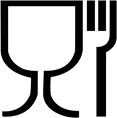In the guide
Although the United Kingdom left the European Union (EU) in 2021, certain pieces of legislation (known as 'assimilated law') continue to apply until such time as they are replaced by new UK legislation, revoked or permitted to expire. This means that our guidance still contains references to legislation that originated from the EU.
In this guide, the words 'must' or 'must not' are used where there is a legal requirement to do (or not do) something. The word 'should' is used where there is established legal guidance or best practice that is likely to help you avoid breaking the law.
This guidance is for England and Wales
If you package food yourself, you must ensure that you use packaging that is suitable for food use. Suitable packaging will be marked 'for food contact' or have a symbol on it that looks like a wine glass and a fork.

It includes things like cling film, ceramic and plastic containers.
Definition of food contact materials
Food contact materials are those that:
- are intended to be brought into contact with food
- are already in contact with food and were intended for that purpose
- can reasonably be expected to be brought into contact with food or transfer their constituents to the food under normal or foreseeable use
This includes direct or indirect contact.
Back to topWhat is required?
You should ask the business supplying you with the food contact materials to supply written evidence that the materials comply with the relevant requirements.
This is known as a 'declaration of compliance' and you can get it from your packaging supplier. You also have to get one if you buy food that is already packaged for sale in any of those materials.
The declaration of compliance will normally contain information about:
- who manufactured or imported the materials or articles or the substances intended for their manufacture
- what they are
- when the declaration was made
- confirmation that the materials or articles meet the relevant requirements of assimilated Regulation (EC) No 1935/2004 on materials and articles intended to come into contact with food and in any specific measures
- information about the compliance of substances used that are subject to any restrictions and/or specifications that will allow the downstream businesses to ensure compliance with those restrictions
- information about the compliance of substances subject to a restriction in food, about the level of their specific migration and, where appropriate, purity criteria, to enable the user of these materials or articles to comply with the law
- specifications on the use of the material or article, such as:
- type or types of food it is intended to be put into contact with
- time and temperature of treatment and storage in contact with the food
- ratio of food-contact surface area to volume used to establish the compliance of the material or article
- confirmation that the material or article complies with any rules on functional barriers when one is incorporated into the material or article
You should keep the declarations with your other records, as these may be asked for by Trading Standards or Environmental Health officers when they visit you.
Back to topFurther information
The Food Standards Agency website has guidance on food contact materials legislation and FCM authorisation guidance.
Back to topTrading Standards
For more information on the work of Trading Standards services - and the possible consequences of not abiding by the law - please see 'Trading Standards: powers, enforcement and penalties'.
Back to topIn this update
No major changes.
Last reviewed / updated: December 2025
Back to topKey legislation
- assimilated Regulation (EC) No 1935/2004 on materials and articles intended to come into contact with food
- assimilated Regulation (EC) No 1895/2005 on the restriction of use of certain epoxy derivatives in materials and articles intended to come into contact with food
- assimilated Regulation (EC) No 2023/2006 on good manufacturing practice for materials and articles intended to come into contact with food
- assimilated Regulation (EC) No 450/2009 on active and intelligent materials and articles intended to come into contact with food
- assimilated Regulation (EU) No 10/2011 on plastic materials and articles intended to come into contact with food
- Materials and Articles in Contact with Food (England) Regulations 2012
- Materials and Articles in Contact with Food (Wales) Regulations 2012
Please note
This information is intended for guidance; only the courts can give an authoritative interpretation of the law.
The guide's 'Key legislation' links go to the legislation.gov.uk website. The site usually updates the legislation to include any amendments made to it. However, this is not always the case. Information on all changes made to legislation can be found by following the above links and clicking on the 'More Resources' tab.

